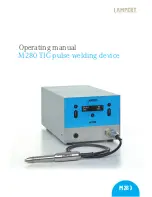
The amplifier channels are named channel A and B. A name can be assigned to each channel to
easily identify its allocation and use. Using the left mouse button, click in the entry field and enter
the desired name for the channel. Press Return on the keyboard to acknowledge your entry.
HINT: Entering channel names is also possible within the Setup & Control Panel on the Config &
Info page.
The CLIP indicator lights whenever the signal of the internal signal processor clips. The signal
processor’s headroom is 12 dB, which is no problem when using normal filter settings. However,
when drastically increasing the level of several adjacent or overlapping filters, distortion of high-
level signals may occur, which the CLIP indicator indicates. In that case reducing the signal-level or
trying a bit more moderate equalizer setting is recommended.
The LIMIT indicator lights whenever the digital limiter of the corresponding channel is activated,
e.g. when the signal level exceeds the specified threshold and the output level is being limited to
this value.
The TL indicator lights when the loudspeaker TEMP limiter of the corresponding channel is
activated.
The LOAD indicator shows whether the load connected to the amplifier output is within the
allowable range or if short-circuit or line interruption has occurred. The green OK-indication signals
that the connected load is between the specified lower and upper limit values. These values are set
in the Setup & Control Panel in the Load screen. The red OPEN indication signals line interruption.
It lights whenever the connected load exceeds the upper limit value. The red SHORTED indication
signals short-circuit at the amplifier output. It lights whenever the connected load falls below the
lower limit value.
HINT: The connected load is monitored continually as soon as a signal with a voltage of > 150 mV
is present at the output. Calculation of signal levels below that threshold is not possible and the
indicator shows the last acquired state.
The TEMP display shows the amplifier’s internal temperature as a graph. The indicator lights green
whenever the amplifier is operated in its nor- mal operational temperature range. The indicator
lights yellow whenever the amplifier builds up heat because of continuous high output. However,
since the internal fans provide sufficient ventilation there is no risk of thermal overload in this state.
As soon as temperature indication changes to red, reducing the output level is strongly
recommended. Otherwise the amplifier might cease operation because of thermal overload.
The MUTE indicator lights when the amplifier is muted. This occurs e.g. during speaker switch-on
delay or when the amplifier is switched off by the protection circuit (see below).
When the red PROT indicator lights, one of the internal protections (thermal overload, short-circuit,
Back-EMF, HF at the output, etc.) has been activated
However, a lit PROT LED does not necessarily mean that the signal path gets switched off. The
differentiated protections concept of the power amplifier results in several protection circuits being
activated one after another, which ensures that under normal circumstances the power amplifier
will stay in the safe and stabile operating range. In case the amplifier needs to be switched off to
prevent power amplifier and connected speaker systems from being damaged, this is indicated by
the PROT and MUTE LEDs being lit simultaneously.
IRIS-Net
REMOTE AMPLIFIER | en 246
Bosch Security Systems B.V.
User Manual
2017.05 | 3.20 | F.01U.119.956
















































